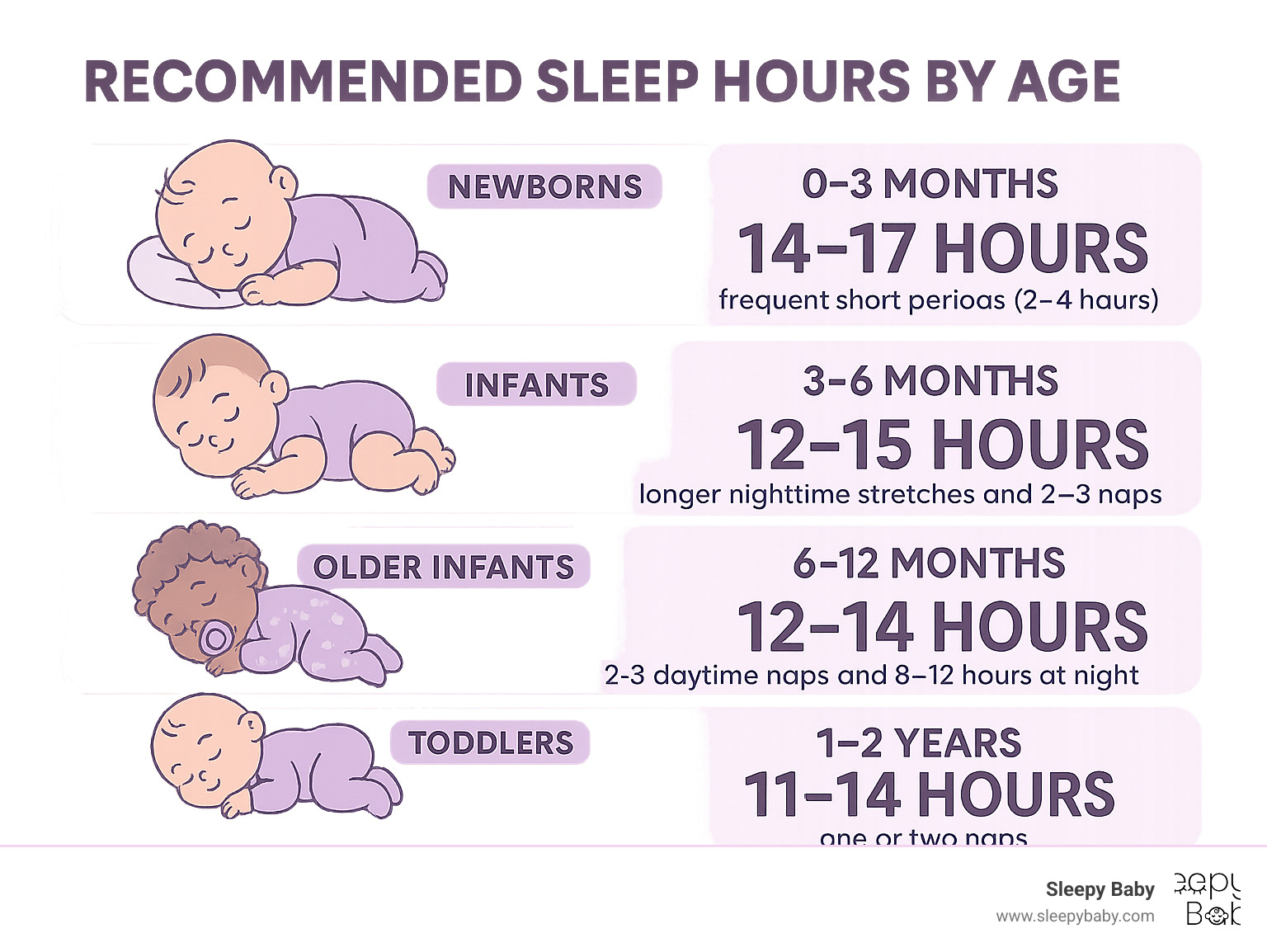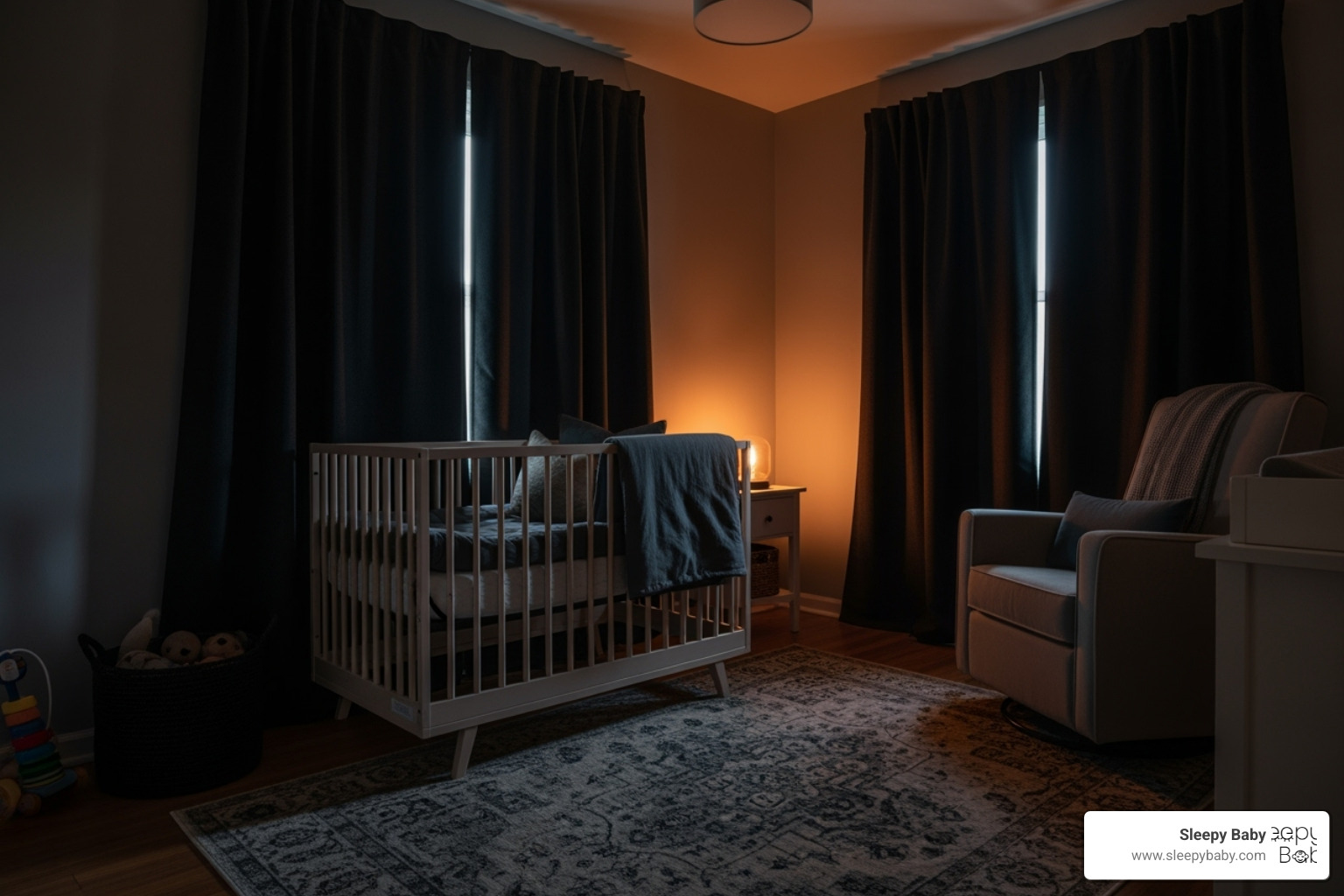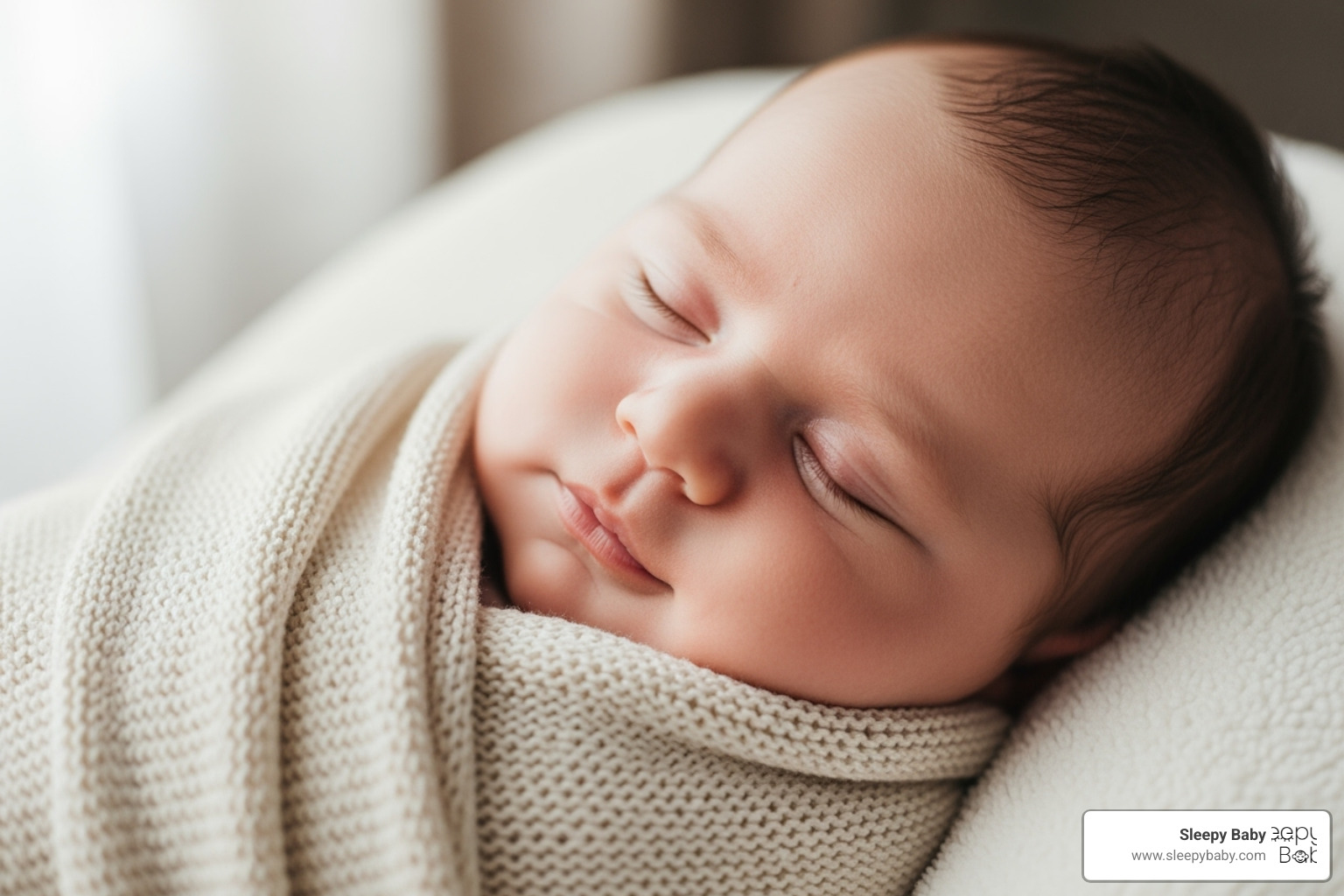The Quest for Peaceful Nights: Why Natural Sleep Solutions Matter
When searching for the best natural sleep aid for babies, exhausted parents often find that the gentlest approaches work better than quick fixes. Here are the top natural methods that actually help:
Most Effective Natural Sleep Aids for Babies:
- Consistent bedtime routine - warm bath, gentle massage, dim lights
- Optimal sleep environment - dark room, 68-72°F temperature, firm mattress
- Safe swaddling - mimics womb security (stop when baby shows signs of rolling)
- White noise machines - modern safety-rated devices at low decibel levels
- Rhythmic tapping devices - gentle motion that mimics caregiver's touch
- Pacifiers - can reduce SIDS risk and provide comfort
Sleep problems affect 20-30% of children, and the stakes couldn't be higher. Babies spend about half their sleep time in REM sleep, which is crucial for brain development, memory formation, and nervous system function. Meanwhile, sleep-deprived parents struggle with focus, memory, and decision-making - creating a cycle that affects the whole family.
The good news? Natural solutions often work better than supplements or medications. Research shows that behavioral changes and environmental adjustments create longer-lasting benefits than sleep aids, helping babies develop healthy sleep patterns that last.
While some parents turn to melatonin or herbal remedies, experts specifically recommend against giving sleep aids to children younger than 5 years except in very rare circumstances. The safest and most effective approach starts with creating the right conditions for natural sleep.
Finding the best natural sleep aid for babies often means combining gentle environmental changes with safe, modern devices that mimic natural soothing motions. This approach helps families establish healthy sleep habits from the start, without relying on supplements or medications.

Understanding Why Your Baby Isn't Sleeping
Picture this: you've followed every sleep tip, read every book, and yet there's your little one at 3 AM, bright-eyed and seemingly ready to discuss the meaning of life. If this sounds familiar, you're not alone. Understanding why babies struggle with sleep is your first step toward finding the best natural sleep aid for babies.
Here's something that might surprise you: newborns are born without a circadian rhythm. That internal clock that tells us to feel sleepy when it's dark and alert during the day? It simply doesn't exist yet for your baby. Instead, their sleep is driven purely by two things: hunger and exhaustion, usually in unpredictable 2-4 hour chunks.
This biological reality means your newborn isn't being difficult - they're just being human. Their circadian rhythm typically starts developing around 8-11 weeks, which explains why those early months feel so chaotic. The good news? This is exactly why consistent routines become so powerful as they grow.
But circadian rhythms aren't the only sleep disruptor. Hunger cues top the list of sleep interruptions, especially for newborns with their tiny tummies. No natural sleep aid can override a genuinely hungry baby, and that's perfectly normal. As babies grow, they'll naturally go longer between feeds, allowing for those precious longer sleep stretches.
Growth spurts are another common culprit that catches parents off guard. Just when you think you've cracked the sleep code, a growth spurt hits around 2-3 weeks, 6 weeks, 3 months, or 6 months. During these periods, babies often become hungrier and fussier, temporarily disrupting those hard-won sleep patterns.
Then there's teething discomfort, which can turn even the best sleeper into a restless night owl. Those emerging teeth cause real pain, and while we can offer comfort, finding gentle ways to soothe them becomes crucial for everyone's sanity.
Perhaps most surprisingly, overtiredness often makes sleep harder, not easier. An overtired baby becomes wired and struggles to settle, which is why watching for early sleep cues and maintaining consistent bedtimes matters so much.
Sleep associations present another interesting challenge. Babies are remarkably good at learning patterns - if they always fall asleep while being rocked, nursed, or held, they may struggle to resettle during normal night awakenings without those same conditions. As we explored in our guide, "Counting Sheep: How to Help Your Toddler Sleep Better," gently helping babies develop independent sleep skills creates lasting benefits.
Environmental factors play a huge role too. Too much light, excessive noise, uncomfortable room temperature, or an unsafe sleep space can all prevent restful sleep. Sometimes the solution is as simple as adjusting the thermostat or adding blackout curtains.
Around 8-10 months, many families encounter separation anxiety, which can make bedtime suddenly challenging again. Your baby has developed enough awareness to realize you're leaving, making gentle reassurance and consistent routines more important than ever.
The key insight here is that the best natural sleep aid for babies doesn't just mask these challenges - it works with your baby's natural development to address the root causes. Understanding what's really keeping your little one awake helps you choose solutions that create lasting, peaceful nights for the whole family.
The Best Natural Sleep Aid for Babies: A Parent's Guide to Gentle Solutions

When you're searching for the best natural sleep aid for babies, you're looking for gentle solutions that work with your baby's natural development rather than against it. The most effective approaches aren't found in a bottle or package - they're behavioral adjustments, environmental changes, and sensory techniques that create lasting sleep habits.
These natural methods are your safest and most effective first line of defense. Unlike supplements or medications, they build a foundation that helps your baby learn to sleep independently while keeping them completely safe.
Creating a Soothing Bedtime Routine: The Best Natural Sleep Aid for Babies
Think of a bedtime routine as your baby's sleep signal - a gentle way of saying "it's time to wind down now." The magic isn't in any single activity, but in the predictable sequence that tells your baby's developing brain that sleep is coming.
A consistent schedule forms the backbone of good sleep habits. When you put your baby down at roughly the same time each night (and for naps), you're helping their internal clock develop. Yes, life happens and flexibility is needed, but consistency when possible pays dividends.
A warm bath works wonders for most babies. The warm water relaxes their muscles, and the slight drop in body temperature afterward naturally encourages sleepiness. Keep the water around 100°F - warm enough to be soothing but not so hot that it overstimulates.
Following the bath, a gentle baby massage with baby-safe lotion creates another layer of relaxation. This isn't just about the physical benefits - it's precious bonding time that helps your baby feel secure and loved. The gentle pressure and rhythmic strokes naturally calm their nervous system.
After massage comes quiet time with calming activities in dimly lit surroundings. Reading a book together, even to a newborn, provides the soothing sound of your voice while keeping stimulation low. Singing a lullaby taps into something beautifully primal - your voice is one of the most comforting sounds in your baby's world. Even quiet cuddles for a few minutes can help them feel secure before being placed in their crib.
The goal is creating a sequence your baby can anticipate and rely on. As we explored in our article, "Dreamland Awaits: Your Guide to Infant Sleep Aids," this predictable routine might just be the most powerful best natural sleep aid for babies because it teaches self-regulation from the inside out.
Optimizing the Sleep Environment
Your baby's sleep space is like a sanctuary - when it's set up right, it practically invites peaceful sleep. Getting the environment perfect is often the difference between a baby who sleeps well and one who struggles night after night.
Darkness is crucial because it signals the brain to produce melatonin naturally. Blackout curtains aren't just a nice-to-have; they're essential for blocking out streetlights, early morning sun, and neighbor's porch lights. Even during daytime naps, darkness helps reinforce your baby's understanding of sleep time versus wake time.
The ideal room temperature sits between 68-72°F. Too warm increases SIDS risk and makes babies uncomfortable and restless. Too cool disrupts sleep in different ways. Dress your baby in lightweight, breathable fabrics and adjust layers rather than cranking up the heat.
Safety comes before everything else in creating the perfect sleep space. Your baby needs a firm mattress in a crib that meets current safety standards - soft surfaces pose serious suffocation risks. Keep the space free of loose bedding, bumper pads, pillows, stuffed animals, and toys. These items look cozy but can be dangerous for sleeping babies.
Always place your baby on their back for every sleep - naps and nighttime. This simple position change has dramatically reduced SIDS rates and remains one of the most important safety guidelines we have.
Room sharing (but not bed sharing) gives you the best of both worlds - your baby sleeps safely in their own space while staying close enough for easy nighttime care. For more detailed guidance on creating the perfect sleep environment, check out our article, "Naturally Restful: Best Sleep Aids for Infants."
Sensory Soothers: The Best Natural Sleep Aid for Babies' Developing Senses

Babies experience the world through their senses, and the right sensory input can be incredibly soothing. These techniques work because they either recreate the comfort of the womb or provide the gentle stimulation that helps babies self-regulate.
Swaddling transforms fussy newborns into peaceful sleepers by mimicking the snug security they knew for nine months. When done correctly with breathable fabric, swaddling suppresses the startle reflex that jerks babies awake. The key is keeping it snug around the arms but loose around the hips for healthy development. Remember: stop swaddling when rolling begins, usually around 4 months, as it becomes unsafe once babies can turn over.
Pacifiers offer multiple benefits beyond simple comfort. They provide the sucking motion that naturally soothes babies while actually helping to reduce SIDS risk according to research. If you're breastfeeding, wait a few weeks until nursing is well-established before introducing a pacifier to avoid confusion.
White noise creates a consistent sound environment that masks sudden household noises and mimics the whooshing sounds of the womb. While some older machines could be unsafe at high volumes, modern safety-rated devices are designed to provide white noise at low-decibel levels - around 50-60 dB, no louder than a running shower. Some are even designed to be placed safely on the baby's chest, presenting sound at a safe level. Always follow manufacturer guidelines for placement and volume. For excellent options, see our guide, "Sleep Tight with These Calming White Noise Machines."
Rhythmic tapping devices represent an innovative approach to the best natural sleep aid for babies. These devices mimic a caregiver's comforting touch through gentle, consistent patting motions. Think about it - when your baby is fussy, your instinct is to pat their back or chest rhythmically. These devices provide that same soothing sensation hands-free, helping babies feel secure enough to fall asleep independently and stay asleep longer.
The beauty of combining these sensory soothers is that they address different aspects of comfort simultaneously - the security of being held, the familiarity of womb-like sounds, and the gentle rhythm that naturally calms babies. Together, they create a multi-layered approach that helps even the most sensitive babies find their way to peaceful sleep.
What to Avoid: A Word of Caution on Supplements

I get it - when you're running on two hours of sleep and your baby is wide awake for the third time tonight, the promise of a "natural sleep aid" can feel like a lifeline. But here's where we need to pump the brakes and talk about some hard truths regarding supplements and medications for babies.
The market is flooded with products claiming to be the best natural sleep aid for babies, but many of these so-called solutions can actually be risky for your little one. Unlike the behavioral and environmental approaches we've discussed, supplements enter uncharted territory when it comes to infant safety.
The Risks of Melatonin for Infants
Let's start with the big one: melatonin. You've probably heard other parents swear by it, and yes, melatonin is a hormone our bodies naturally produce to regulate sleep. But giving melatonin supplements to babies? That's a whole different story.
Here's what makes melatonin supplements particularly concerning: the FDA doesn't regulate them like medications. Since melatonin is classified as a dietary supplement, it doesn't undergo the rigorous testing that prescription drugs do. This means the bottle might say one thing, but what's actually inside could be completely different.
A recent study found that some had potentially dangerous amounts of melatonin - sometimes up to 478% more than what was listed on the label. Even more alarming, some products contained unlisted ingredients like serotonin or CBD that definitely don't belong in a baby's system.
The consequences of this inconsistency are showing up in emergency rooms across the country. According to a CDC report, "Pediatric Melatonin Ingestions — United States, 2012–2021," melatonin poisoning reports in children skyrocketed by more than 260,000 cases between 2012 and 2021. While most cases weren't life-threatening, that's still a staggering number of children ending up in hospitals because of a "natural" sleep aid.
But even if the dosage were consistent, we simply don't know the long-term effects of giving melatonin to developing brains and bodies. Some experts worry about potential impacts on hormonal development, including concerns that long-term use might trigger early puberty, though more research is needed.
The bottom line? Pediatric experts overwhelmingly agree that melatonin should only be given to children - especially infants - under very specific medical circumstances and with explicit guidance from a pediatrician. It's not a first-line solution for typical sleep challenges, and it's certainly not the best natural sleep aid for babies despite what marketing might suggest.
Other Herbal Remedies and "Sleep Drops"
Beyond melatonin, you'll find shelves full of "natural" sleep aids: chamomile drops, magnesium lotions, passionflower tinctures, and various herbal blends promising peaceful nights. While these might sound gentler than pharmaceutical options, they come with their own set of concerns for babies.
Magnesium lotions have become particularly trendy, with parents sharing success stories online. The reality? There's little scientific evidence that topical magnesium absorbs well enough through the skin to actually impact sleep. If your baby seems more relaxed after a magnesium lotion massage, it's likely the soothing massage itself providing the benefit, not the magnesium. While topical application is generally safer than oral supplements, it's still worth discussing with your pediatrician.
Chamomile and other herbal remedies might have a long history of traditional use in adults, but babies aren't just tiny adults. Their developing systems process substances very differently, and what's safe for grown-ups can be harmful to infants. Most concerning is the lack of research specifically in babies - we simply don't have enough data to determine safe dosages or potential side effects for the youngest patients.
There's also the risk of allergic reactions to consider. Any new substance, whether applied topically or given orally, can trigger sensitivities in babies. And with unregulated supplements, you never know exactly what you're getting - ingredient lists can be unclear, and cross-contamination during manufacturing is always a possibility.
Always check ingredients carefully and consult your pediatrician before trying any herbal remedy or "sleep drop." If you suspect an adverse reaction or accidental ingestion, don't hesitate to contact Poison Control immediately.
The truth is, the best natural sleep aid for babies isn't found in a bottle - it's found in the consistent routines, optimal environments, and gentle sensory soothers we've already discussed. For more insights on this topic, you might find our article, "Homeopathy for Sweet Dreams: Infant Sleep Aids," helpful in understanding the nuanced approach to natural sleep solutions.
When to Consult a Pediatrician
While we've explored the best natural sleep aid for babies through gentle routines, optimal environments, and sensory comfort, there comes a time when sleep struggles might signal something deeper. As parents, we develop an intuition about our babies - and when that little voice says something isn't quite right, it's worth listening to.
Sometimes, despite our best efforts with consistent bedtime routines and perfectly optimized sleep spaces, persistent sleep issues continue to plague our little ones. If you've been diligently working on natural sleep strategies for several weeks without improvement, or if your baby's sleep patterns seem dramatically different from age-appropriate norms, it might be time for professional guidance.
Breathing concerns during sleep should always prompt an immediate call to your pediatrician. Watch for loud snoring, gasping sounds, or those heart-stopping moments when your baby seems to pause their breathing altogether. These could be signs of infant sleep apnea or other respiratory issues that need medical evaluation. Heavy or labored breathing during sleep is another red flag that warrants professional attention.
Severe reflux (GERD) can turn sleep into a battlefield for babies. If your little one arches their back during feeds, spits up excessively, or seems uncomfortable when lying flat, the discomfort might be preventing restful sleep. This condition often requires medical intervention beyond natural sleep aids.
Weight gain issues can also intersect with sleep problems. If your baby isn't gaining weight appropriately or shows signs of failure to thrive, their sleep disruptions might be contributing to or resulting from underlying health concerns.
Excessive crying or colic that interferes significantly with sleep deserves professional attention, especially if it persists beyond the typical 3-4 month window. While some fussiness is normal, inconsolable crying that prevents adequate rest for baby and family needs evaluation.
Any signs of illness - fever, persistent cough, unusual fussiness, or changes in feeding patterns - can severely impact sleep and should prompt a pediatric consultation. Sometimes what appears to be a sleep problem is actually a symptom of something else entirely.
Finally, never underestimate the importance of parental concern and well-being. If you're consistently worried, anxious, or overwhelmed by your baby's sleep patterns, that's a completely valid reason to seek help. Your mental health directly impacts your baby's well-being, and getting support is part of good parenting, not a sign of failure.
A pediatrician can rule out medical conditions, offer personalized guidance for your baby's unique needs, and if necessary, connect you with a pediatric sleep specialist. Seeking professional help doesn't mean natural methods have failed - it means you're being thorough in caring for your little one.
Conclusion: Building a Foundation for Healthy Sleep
The journey to peaceful nights with your baby is a marathon, not a sprint. When you're running on two hours of sleep and your third cup of coffee, finding the best natural sleep aid for babies can feel like searching for a miracle cure. But here's what we've finded: the most effective and lasting solutions aren't found in a bottle or a quick fix - they're built one gentle night at a time.
Throughout this guide, we've uncovered how understanding your baby's unique sleep patterns makes all the difference. Newborns don't even have a circadian rhythm yet! Those 2 AM wake-up calls aren't personal - they're just biology. Growth spurts, teething, and developmental leaps will temporarily throw curveballs at your carefully crafted sleep schedule, but that's completely normal.
The consistent bedtime routine we discussed - that warm bath, gentle massage, and quiet story time - becomes your secret weapon. It's like giving your baby a roadmap to dreamland every single night. Pair this with an optimized sleep environment (dark room, cool temperature, safe sleep space), and you're creating the perfect conditions for natural sleep.
Those sensory soothers we explored? They're not just helpful - they're game-changers. Safe swaddling mimics the womb's security, pacifiers offer comfort while potentially reducing SIDS risk, and modern white noise machines create that consistent, womb-like sound environment babies crave. The beauty of these approaches is they work with your baby's natural instincts rather than against them.
Patience truly is your best friend here. Some nights will be harder than others, and that's okay. Every baby develops at their own pace, and what works for your neighbor's baby might not work for yours. The key is staying consistent while remaining flexible enough to adjust as your little one grows.
For parents seeking a tool that combines several of these natural methods - like safe, low-decibel white noise and rhythmic tapping - exploring intelligent sleep aids like those from Sleepy Baby can offer that extra helping hand. Our devices are designed to mimic a caregiver's comforting touch, providing the consistent, gentle patting that many babies find irresistible. It's like having a tireless, patient hand always ready to soothe your little one back to sleep.
The most important thing to remember? You're not just helping your baby sleep tonight - you're teaching them skills they'll carry for life. These natural approaches help babies learn to self-soothe and develop independent sleep habits that will serve them well beyond infancy.
Every baby is wonderfully different, so don't get discouraged if it takes time to find your rhythm. Trust your instincts, observe your baby's cues, and never hesitate to reach out to your pediatrician when you need guidance. By prioritizing these gentle, evidence-based approaches, you're giving your little one the gift of healthy sleep patterns that will benefit your entire family.
Sweet dreams are coming - sometimes they just need a little patience and the right natural approach to find their way. For more practical solutions and product insights, explore our guide, "Newborn Sleep Solutions: A Product Roundup."



